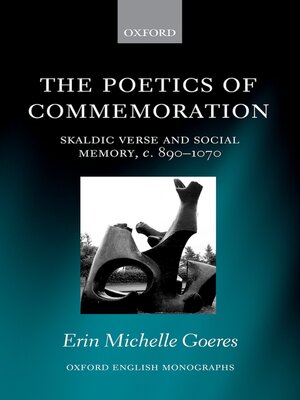The Poetics of Commemoration
ebook ∣ Skaldic Verse and Social Memory, c. 890-1070 · Oxford English Monographs
By Erin Michelle Goeres

Sign up to save your library
With an OverDrive account, you can save your favorite libraries for at-a-glance information about availability. Find out more about OverDrive accounts.
Find this title in Libby, the library reading app by OverDrive.



Search for a digital library with this title
Title found at these libraries:
| Loading... |
The Poetics of Commemoration is a study of commemorative skaldic verse from the Viking Age. It investigates how skaldic poets responded to the deaths of kings and the ways in which poetic commemoration functioned within the social and political communities of the early medieval court. Beginning with the early genealogical poem Ynglingatal, the book explores how the commemoration of a king's ancestors could be used to consolidate his political position and to provide a shared history for the community. It then examines the presentation of dead kings in the poems Eir?ksm?l and H?konarm?l, showing how poets could re-cast their kings as characters of myth and legend in the afterlife. This is followed by an analysis of verse in which poets use their commemoration of one king to reinforce their relationship with his successor; it is shown that poetry could both help and hinder the integration of the poet into the retinue of a new king. Focusing then on the memorial poems composed for Kings ?l?fr Tryggvason and ?l?fr Haraldsson, as well as for the Jarls of the Orkney Islands, the book considers the tension between public and private expressions of grief. It explores the strategies used by poets to negotiate the tumultuous period that followed the death of a king, and to work through their own emotional responses to that loss. The book demonstrates that skaldic poets engaged with the deaths of rulers in a wide variety of ways, and that poetic commemoration was a particularly effective means not only of constructing a collective memory of the dead man, but also of consolidating the new social identity of the community he left behind.






